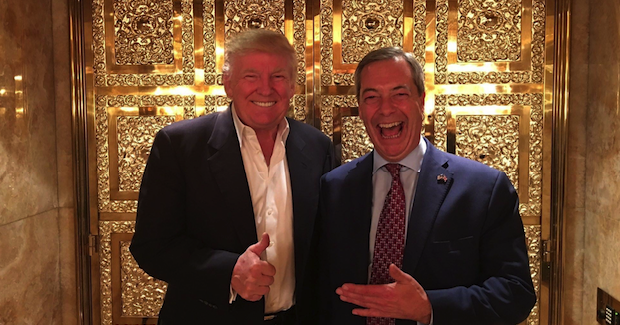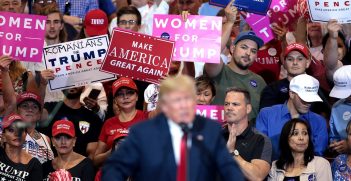Trump, Globalisation and Compromise

Donald Trump’s protectionist rhetoric is evocative of a global trend away from globalisation. To prevent democracy becoming a casualty in the process, states may need to compromise on free trade policy to prevent disillusioned voters turning toward more authoritarian capitalism.
Globalisation has been a very important part of the development story of the 21st century. To continue the beneficent processes of what’s been happening in much of the developing world, then the world could look forward to a future in which most people on earth could enjoy living standards similar to Australians.
One does not have to reflect for very long to be aware of the wonderful possibilities of such a world. Amongst other things, it would mean that open trade and exchange would not be associated with the unwanted movement of people as a result of economic distress and it would not be associated with downward pressure on living standards in developed countries. It would be a world in which smooth-functioning democracies would be more secure. It is a world worth working for. But it’s a world which depends on the international movement of goods and services, ideas, institutions, capital and—to a lesser extent—people.
Will political developments, especially in America with the election of Donald Trump, but more generally in the political culture of the developed world, get in the way? Is the apparent retreat from globalisation just political froth, or will it have substantial consequences for global development?
On trade, the retreat from globalisation can be seen in the numbers. Growth in international trade has slowed down relative to growth of economic activity. It is much slower recently than at any earlier period since World War II. That is partly a reflection of the retreat into protectionist attitudes. With the election of Trump, we had the immediate withdrawal of the United States from the Trans-Pacific Partnership (TPP). That in itself isn’t a great blow for free trade because the TPP was not a free-trading instrument. But the lines of division in the US polity over the TPP were between the supporters and the opponents of open trade. It was certainly a political defeat for open trade, even if the TPP itself was not unambiguously favourable to free trade.
More important is the persistence of rhetoric around Donald Trump about his wish to introduce protectionist measures. More worrying—but this was stronger in pre-election rhetoric than it is now—is the prospect of high discriminatory taxes, in particular on imports from China and Mexico. If it’s part of a general across-the-board taxation reform, covering all goods and services and is not discriminatory against particular countries, then it may actually be benign.
But any increase in the budget deficit—and it has started with the recently announced dramatic increase in US defence expenditure—has to be funded, which means capital inflow. In anticipation of increased budget deficits, there has already been capital inflow and a big increase in the US dollar exchange rate. That has knocked on the head the modest reversal of the long-term decline in US manufacturing employment. The people who elected Trump are already getting it in the neck, but that was always going to be the case.
In this way, the difficulties for global trade could come, not so much in the beginning of Trump’s term, but once there is a feeling that things aren’t working; a higher exchange rate, a larger trade deficit and stagnation in manufacturing employment after a period of slight growth will generate a reaction. It’s easy to imagine that the president will then blame everything except the actual causes of the problem whicht may lead to new pressures for discriminatory trade measures against the countries that have trade surpluses with the United States.
What does all this mean for Western democracies more broadly?
We need to think about economising on globalisation; making sure we stay open on the things that matter most while being prepared to accommodate pressures for gradualism on other matters.
It was a step too far to start including in bilateral trade agreements and agreements like the TPP measures that effectively agreed on compromise of domestic sovereignty on quite a lot of issues. That was a red button issue that led to reaction against international trade, when it wasn’t necessary for open international trade and investment.
Looking at immigration, Australia has maintained an extraordinarily large immigration program. It would be a mistake to think that there won’t be a big reaction against that unless the country does much better at investment in infrastructure to accommodate the huge increase in populations in Melbourne and Sydney.
Australia has gone quite a long way in the 21st century in expanding immigration of a kind that does it the least good as a society. Once, when immigrants were accepted they were on a path to citizenship as soon as they arrived. They had incentives to share Australian values and aspirations.
But now, a very large number of the people who come to Australia are, for an indefinite period, not on a path to Australian citizenship. These include the large number of 457 visa holders. This has unnecessarily encouraged reaction against immigration by promoting a lot of areas of immigration that are of lesser value to Australia and which draw less commitment to Australian values and society.
But overall, at least in these earlier years, the retreat from globalisation associated with Trump is likely to have only moderate influence on global development. At this stage, Trump and the retreat from globalisation is likely to have more influence on political relations around the world.
There’s no doubt that the Trump period has been associated with a decline in the prestige of democracy at a time when democracy is in a real contest with alternative political systems. The central-planning type of socialism associated with the former Soviet Union was dead and buried in the 20th century—today, the competition between political systems is between authoritarian and democratic capitalism.
Authoritarian capitalism is currently enjoying boom-time conditions. The strength of Xi Jinping, of Putin, developments in Egypt, in Turkey, in the Philippines, Thailand and elsewhere means that this is not a time when we want democracy’s prestige to fall in the international community. Rather than the purely economic outcomes, this will be the most important consequence of Trump’s leadership.
Ross Garnaut AO is a distinguished professor of economics at the Australian National University and both a vice-chancellor’s fellow and professorial fellow of economics at The University of Melbourne.
This article is an excerpt of Professor Garnaut’s presentation hosted by AIIA NSW on 28 February 2017. The full transcript of his presentation can be found here.
This article is published under a Creative Commons Licence and may be republished with attribution.





